ESRC Social Science Week
Monday 23rd June 2003, Priory Street Centre, York
ESRC Research at York: Implications for Future Regional Needs
Introduction
The aims of this Innovative Health Technologies Programme supported workshop were to report on and review current ESRC research located in York that will be of interest to the health, social services and voluntary and community sectors in the region and to explore and determine, with workshop participants, how evidence-base research information might be best deployed to contribute to policy and practice in the future.
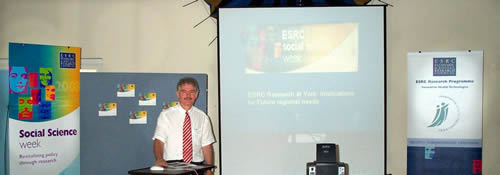
Insights
The papers presented at the meeting offered various insights into health, disability and care. After Webster (IHT Director) provided a review of the IHT Programme and its primary focus, Noyes offered a rich analysis of life-sustaining technologies used by patient-children in their own home, from the children's perspectives, demonstrating that any evaluation that ignores such perspectives will be seriously limited. Collins showed how, through close examination of communication in multidisciplinary health care, it was possible to identify the distinctive contributions that nurses and doctors make to patient care, the tensions between them, and how they might be better combined to enhance a patient's experience. Woods examined the interactions between wheelchair design and use, independent living, and community services, and showed how the continued definition of the wheelchair as solely a 'medical device' has resulted in a long-term failure to incorporate the chair users' needs into multiple social and physical environments. Finally, Croucher offered a detailed account of how systematic review of social science evidence is undertaken through reference to her own evidence based work on health and social policy; this could provide a conduit for regional user needs for information.
Messages
There were four core messages to policy-makers that emerged from the debate following the papers: first, in regard to evidence-based (EB) research, that the ESRC and policy agencies need to support more practice based research and to encourage researchers to translate EB knowledge into evidence informed policy-making at the regional level; second, that there is considerable local/regional knowledge (for example, the greater York area holds up to 20,000 voluntary and community service groups that have limited research skills and resources but considerable understanding of health, housing and social care issues): the provision of a readily accessible 'observatory' or 'clearing house' of social science work (and better information about the ESRC's own EB network) would be extremely helpful in building capacity in the informal sector; third, policy makers still have far to go in developing multi-agency research that opens up and integrates the current health, housing and social care silos.
Research Questions
A number of research questions need to be addressed as a result of the Workshop, including:
- What are the effects of the translation of social science research through localised political and bureaucratic processes at a regional level and what are the unintended effects of this?
- What are the implications for user, designer and provider (such as a PCT) of the increasing relocation of clinical technologies in domestic and other non-clinical settings?
- How do new technologies disturb 'integrated care pathways' and the desire to stabilise and standardise the National Health Service Framework guidelines?
- What is the relationship between health technologies and the built environment at a regional level designed to foster familial, residential and community security and well-being?
Speaker Abstracts and Biographies
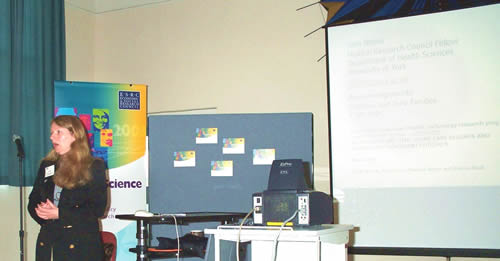
Jane Noyes is a Medical Research Council Fellow specialising in health
services research at the Department of Health Sciences, University of York.
She is also Co-Convenor of the Cochrane Qualitative Research Methods Group.
She is currently completing a number of mixed-method studies around 'technology-dependent'
children looking at the cost of their care, health-related quality of life,
and the views and experiences of children and their families as service
users. In addition, Jane is undertaking methodological work to integrate
qualitative findings into quantitative systematic reviews of effectiveness.
Her two most recent publications are: Noyes et al (2002) Analysis of NHS
Hospital Episode Statistics for children and young people aged 0-19 yrs
in England and Scotland, York Health Economic Consortium; and with Stalker
et al (forthcoming Pavilion Press), Children with complex support needs
in healthcare settings for prolonged periods: Their numbers, characteristics
and experiences.
Abstract
This paper focuses on the perspectives of children and young people who use medical devices at home and their siblings. Findings presented here are derived from a wider study of the temporal and organisational effects of home care regimes for 'technology-dependent' children and their families.
The experiences of 13 'technology-dependent' children and 15 siblings from 36 families were examined using a variety of qualitative methods, including semi-structured interviews, time-line drawings diaries and photographs. All the children in the sample used (or had recently used) one or more medical devices on a daily basis. The devices were associated with artificial feeding, assisted ventilation, dialysis and other forms of technologically-based care.
We will outline the rhythms and routines of the daily lives of children and their siblings and discuss the extent to which the use of medical devices at home impacts on their lives. We conclude by looking at the implications for policy and practice for this group of children and their families.
Jane's presentation can be found here - pdf
Jane's email contact is jn109@york.ac.uk
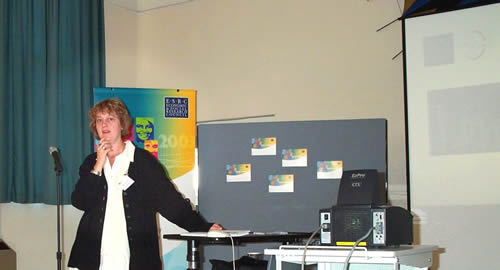
Karen Croucher is a Research Fellow at the Centre for Housing Policy at the University of York. Her interests include: the interface between housing and health, (mental health in particular), and housing and support for older people. She is co-author of the recently published systematic review "Paying the Mortgage? A Systematic Literature Review of Safety Nets for Homeowners." (Croucher, Quilgars, Wallace et al, 2003), and has recently completed a two year evaluation of Hartrigg Oaks, the UK's first Continuing Care Retirement Community for the Joseph Rowntree Foundation. Current on-going work include: a systematic review of respite for carers of people with dementia; an evaluation of the housing and support needs of older people in rural areas; and a comparative evaluation of innovative schemes providing housing and support for later life.
Abstract
Reflecting the growing interest in evidence and its application to all aspects of policy development, the ESRC has funded a programme of research projects which are examining how evidence based policy can be generated in a number of different social policy areas including public health, housing, education, and the criminal justice system. Beyond developing an evidence base in a number of topic areas, a key aim of the programme is to develop and refine the methodologies required for identification, appraisal and synthesis of evidence. The research projects are being conducted by seven 'evidence nodes' located at different universities across the UK. The node based at York is concerned with evidenced based health and social policy and is directed by Professor Sally Baldwin.
'Paying the Mortgage? A Systematic Literature Review of Safety Nets for Homeowners' (Croucher, Quilgars, Wallace et al, 2003), the first review undertaken by the York node was published earlier this year. It applied the methodology of a systematic review to a complex policy field, that of sustainable homeownership. The review has sought to collate and synthesise current evidence relating to the effectiveness of interventions that are intended to support mortgagors in financial difficulties, and prevent arrears and repossessions.
Sustainable homeownership is a key housing policy goal. Owner occupation is a diverse tenure, and mortgagors are exposed to a range of risks that may result in loss of income. Current safety net provision relies on both public and private provision to assist homeowners who are unable to work. The review considered the four 'safety nets for mortgagors: Income Support for Mortgage Interest (ISMI), Mortgage Payment Protection Insurance (MPPI), other types of private insurance and flexible mortgages.
As intended, the review also exposed some of the difficulties and challenges faced by those attempting to undertake a systematic review in a complex areas, where different stakeholders - mortgage lenders, insurers, government, consumers - have very different perceptions of effectiveness. Many sources of evidence where explored, and different types of evidence were entered into the review. Useful lessons have been learned, and are being applied to the undertaking of a growing number of systematic reviews at York.
Karen's presentation can be found here - pdf
Karen's email contact is klc1@york.ac.uk
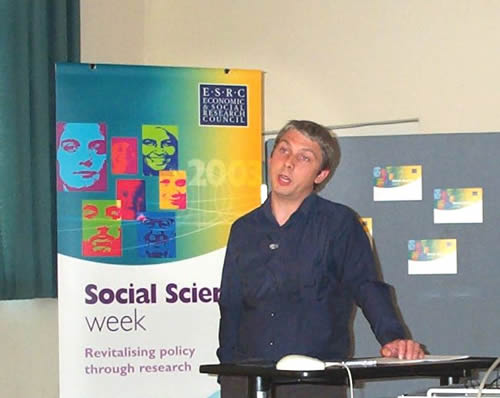
Brian Woods is a Research Fellow at the Science and Technology Studies Unit, Department of Sociology, University of York. He is currently working on A Historical Sociology of the Wheelchair, with colleagues Dr. N. Watson and Prof. D. MacKenzie, under the ESRC/MRC Innovative Health Technologies Programme. Brian's other research interests include space technologies and his two most recent publications are: Brian Woods and Nick Watson (forthcoming) 'When Wheelchair Innovation in Britain was Under State Control,' Technology and Disability; and Brian Woods, (2003) 'Heated Debates: A History of the Space Shuttle's Thermal Protection System, 1970-1981,' Quest: The History of Spaceflight Quarterly 10, 3: 39-55.
Abstract
Because of their inextricable links to injury and illness, wheelchairs have long been associated with medicine. Historically, the understanding of wheelchairs solely as medical device had wider consequences that disabled users in a myriad of different ways: It labelled the occupier as passive or ill. Resulted in a lack of understanding on the part of agencies that supplied wheelchairs and companies that manufactured them about how they were actually used; and led to the neglect of public transport systems to build-in the wheelchair and the failure of architecture and town planning to account for wheelchair use.
Despite recent antidiscrimination legislation, a cultural shift in how we view disability, and progress in wheelchair design (all engendered largely by disabled people themselves), wheelchairs remain far removed from the status of everyday objects. As such, wheelchair users still continually faced a society that treats wheelchair use as abnormal.
The presentation will broadly explore the interactions between wheelchair design and use, independent living, and community services.
Brian's email contact is bw8@york.ac.uk
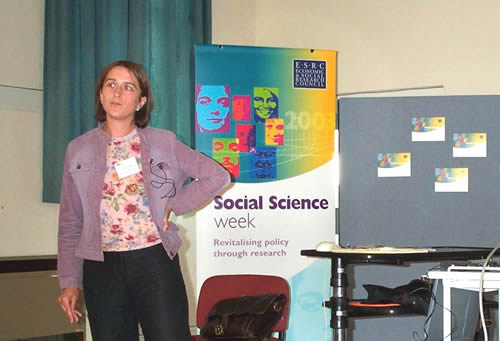
Sarah Collins is a Research Fellow and Lecturer in Communication working in three departments in the university: Health Sciences, Sociology, and the Hull/York Medical School. Her research and teaching lie in the field of communication: health care consultations, communication disabilities, and talk in institutional settings. Her particular interests are: interdisciplinary research; the synthesis of different methods for studying communication; the creation of multimedia resources, with interprofessional and cross-disciplinary applications, for teaching communication.
Abstract
It tends to be assumed that the simple presence of multidisciplinary input in the care of a patient is some guarantee of patient-centredness and improved quality in health care. In our study of effective communication in multidisciplinary health care, we have been exploring, in detail, how communication with patients works in multidisciplinary teams. In particular, we have considered how communication with an individual patient is managed across doctors and nurses. What distinctive contributions do nurses and doctors each bring? Do these combine to enhance a patient's experience?
Our analyses suggest some unique properties and qualities of nurses' and doctors' communication with the same patient: for example, in how advice is given to a patient; in the part played by laughter; in the use of technical and non-technical language. In this presentation, we will:
- outline some of these different features, using examples from our video-recordings of consultations as illustration;
- discuss how the different properties we have observed reflect different forms of social relationship between patients, nurses, and doctors;
- consider some effects of different professionals' input on the organisation and delivery of care in multidisciplinary teams.
In the conclusion, we will highlight some implications of our findings for policy and practice in multidisciplinary health care.
Sarah's report can be found here - pdf
Sarah's email contact is sfc1@york.ac.uk
The Panel Discussion
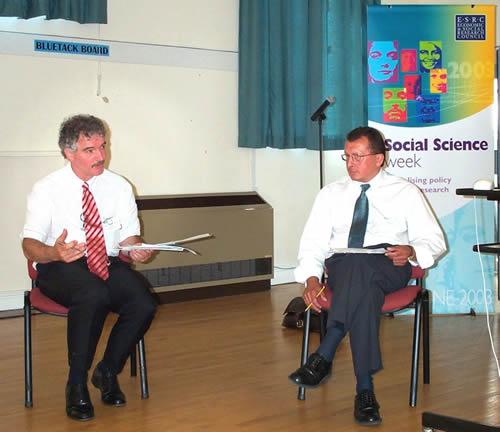
Andrew Webster, Jim Crook
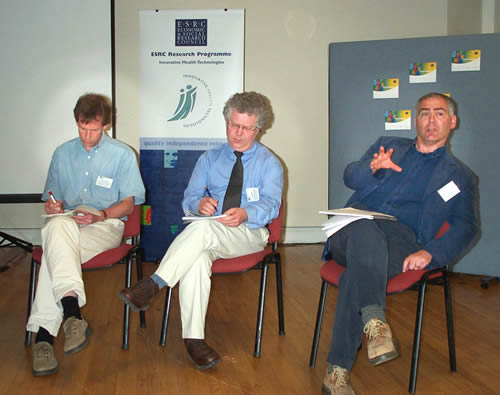
Steve Webster, Alex O'Neil, Brian Fergason
Some of the Participants

